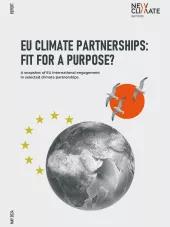Facing geopolitical tensions and economic uncertainties, the EU is recommitting to using green industrial policy to enhance its competitive position in the global clean economy. At the same time, the EU stands at a pivotal moment in its external action and international partnerships approach.
Partnerships play a dual role in delivering on the EU’s commitments to help enable other countries’ transitions, as well as building geoeconomic security. This report provides guidelines for designing and implementing strong EU partnerships, starting with robust principles for the EU to follow. The guidelines then provide key considerations the EU should weigh when developing partnerships.
Principles for building strong partnerships
The following principles are introduced to guide the development and implementation of strong partnerships:
- Mutual Benefit and Just Transition
- Inclusivity
- Robust Support and Financial Commitment
- Transparency and Alignment with both EU and partner country goals
Five key considerations for establishing effective partnerships
As the EU seeks to strengthen its offer to partner countries, five key considerations can serve as a framework to guide the design and implementation process.
- Scope: Partnerships require a clearly defined scope determining the shared objectives, sectors included, duration, and methods of implementation.
- Partner Selection: A structured selection framework covering general, partnership-specific and geopolitical criteria can guide the EU in targeting high-impact partnerships that align with strategic goals.
- Governance: A clear governance structure, defined roles and responsibilities, enhanced coordination between EU and Member States, and internally, plus targeted public communication campaigns are crucial for improving the perception of the EU as a partner.
- Support Mechanisms: Adequate financial and non-financial resources, both private and public finance, capacity building and knowledge sharing are necessary to maximise impact, build trust and ensure mutual benefits in the partnership.
- Monitoring and Evaluation: Effective monitoring and evaluation is crucial to ensure transparency and accountability to the public and to track finance flows and partnership’s impact.
In the report, we show how these above principles and considerations can be effectively applied to the recently announced Clean Trade and Investment Partnerships.












